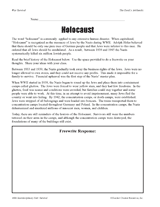

Yavneh Academy Holds Fourth Grade Storytelling Festival Adler’s job, which ultimately extended her father’s life in the ghetto.

He rewarded her ethical behavior by switching Mr. Upon hearing Maniusia’s story, he insisted on meeting her directly. He had the impossible job of reporting to Nazi authorities while trying to help his fellow Jews as best as he could. She comes face-to-face with one of the most controversial figures of wartime Poland, Jacob Rumkowski, known as the “king” of the Lodz Ghetto. Even in great despair, she believed that God protects those who follow Him. She explains to her friend that there is a commandment in the Torah to return a lost item to its owner and therefore she could not take someone else’s wages. However, Maniusia discovers an identification card inside of the wallet and insists on bringing it to the authorities. At the advice of her friend, she is urged to keep the money that could easily sustain her family for months. Maniusia finds a wallet on the street containing 48 Marks. Adler had been forced to take a job hauling other people’s waste. They relocated to Lodz in the hope that circumstances would improve.

As the story continues, the Germans began to invade Poland and life, as Maniusia and her family know it, changes rapidly. While her parents encouraged daily Torah study, Maniusia was quite inquisitive, asking many questions, yet not always obtaining answers. The story opens with Maniusia, a young girl, living a privileged life in Poland, enjoying normal activities like playing soccer and enjoying treats like rugelach.


 0 kommentar(er)
0 kommentar(er)
